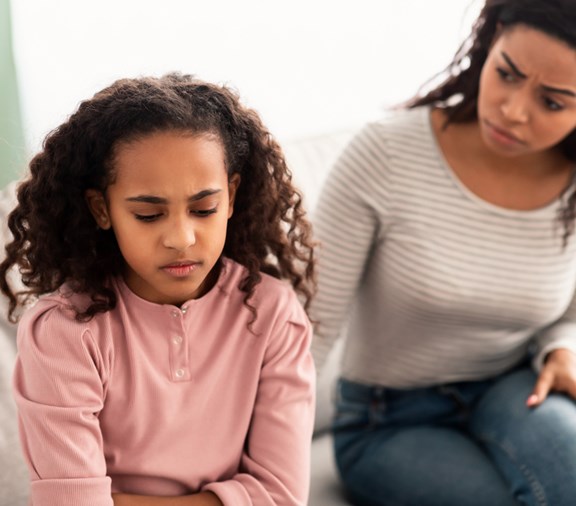
Is It a Bad Mood … or Childhood Depression?
October 3, 2024
When a child goes through puberty, they experience many changes until they reach sexual maturity. Parents will notice both physical and emotional changes during this time.
For example, on average, girls have their first periods around age 11 or 12. Around the same age, boys may start growing several inches a year and notice their voice cracking and, eventually, deepening.
Puberty lasts several years. It can start as early as age eight for girls and age nine for boys.
During these stages from elementary to high school, your child will experience irritation, anger, sadness—and other passionate feelings. Your easy-going child might unexpectedly argue, burst into tears, or not want to talk at all. They may lose their appetite or eat double their normal amount.
Are these behaviors normal, or are they warning signs of depression?
Warning Signs of Depression
Depression, also called clinical depression, is a serious illness that causes sadness and loss of interest that can last for weeks, months or even years.
Pre-teens and teenagers with depression can have trouble starting or finishing everyday activities. Sometimes people with depression feel that life isn't worth living.
Some warning signs of depression are:
- Having frequent headaches or stomach aches.
- Sadness.
- Feeling tearful or crying a lot.
- Suddenly not enjoying favorite or regular activities.
- Avoiding friends.
- Having trouble focusing.
- Caring less about school.
- Eating more or less than usual.
- Losing or gaining weight.
- Sleeping more or less than usual.
- Tiredness or low energy.
- Feeling like everything is their fault.
- Feeling they are not good at anything.
- Sometimes wanting to die.
Differences Between Depression and Bad Moods
Pre-teens and teenagers can experience most of the warning signs of depression, but still not be at risk for the disorder.
Some questions to ask yourself about your child include:
- Are the moods and behaviors severe?
Signs of depression include emotional outbursts, unusual behavior patterns and negative or pessimistic thoughts. Moody behavior is usually less extreme.
- How long has the behavior lasted?
When these new behaviors and thoughts continue over weeks or months, it’s less likely to be normal mood swings.
- Do the bad moods show up everywhere?
A person with depression will usually show signs in many areas of life, from home to school to work, and with both family and friends.
- Is there a possible reason for the bad mood?
If your teen has a new, demanding school schedule, that could explain tiredness or problems with schoolwork. If they choose to spend most of their time alone in their bedroom, they may simply need more privacy and quiet time than in younger years. If they gain or lose significant amounts of weight, they may have a medical problem that needs to be treated.
When to Seek Help
If you’re concerned about any changes in your child’s emotions, behaviors or thoughts, call your child’s doctor.
Parenting pre-teens and teenagers is tough. Get support, so you can then better support your child.
Need help for depression, anxiety, or other concerns?
We are here to help you with behavioral health treatment for:
- Depression
- Anxiety
- ADHD
- Alcohol and drug use
You do not need approval for individual, family, or group therapy. Also, you do not need a referral from your regular doctor.
English/Spanish interpreter services available 24 hours a day, 7 days a week.
- STAR Medicaid: 1-888-672-2277
- CHIP/CHIP Perinate: 1-888-814-2352
- TTY 7-1-1
Available from 8 am to 5 pm CST, Monday - Friday (except state holidays). Leave a voice message during non-business hours and on weekends.



